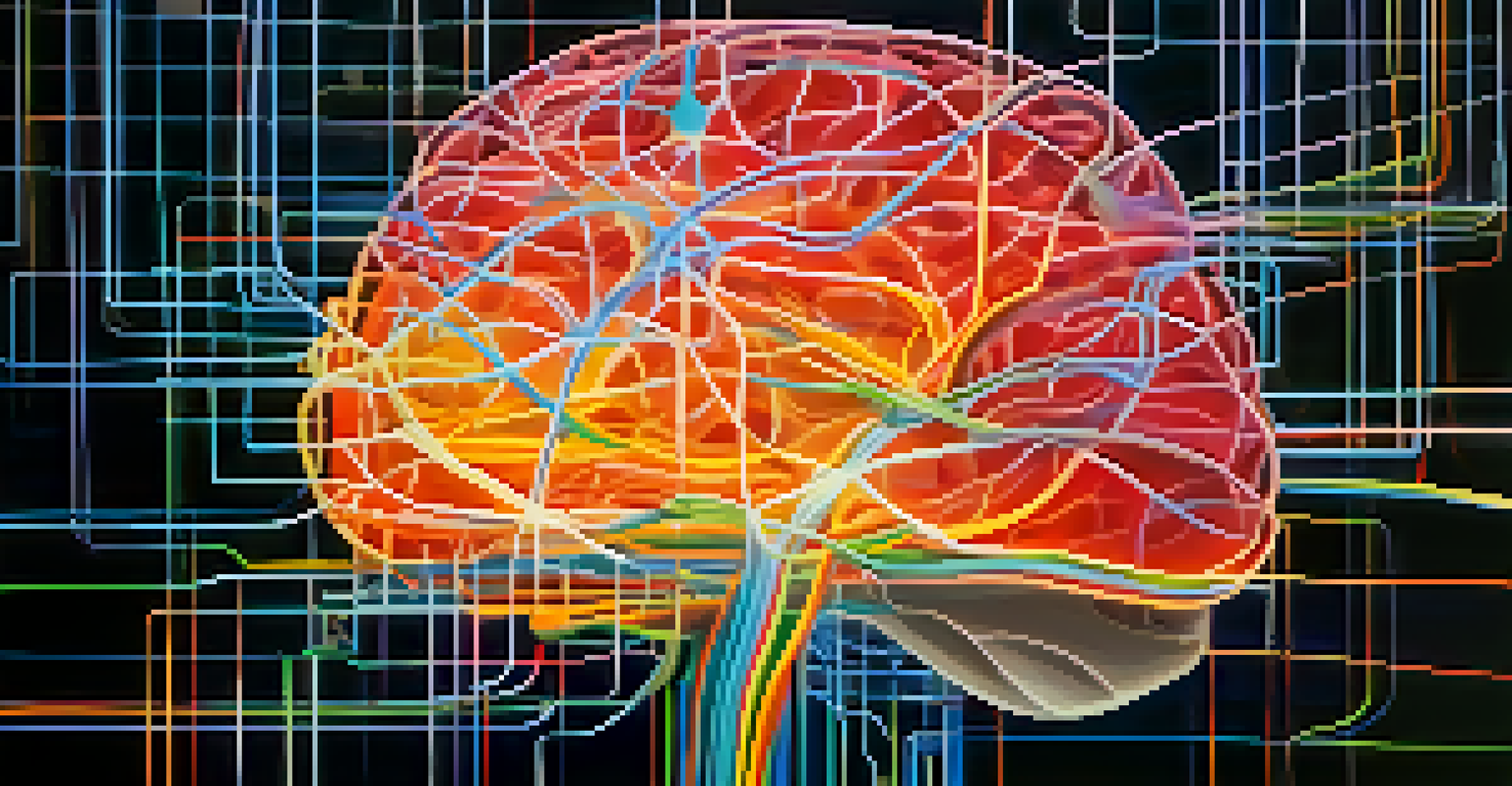Psychedelics and Neuroplasticity: A Healing Connection

Understanding Psychedelics and Their Effects
Psychedelics are substances that alter perception, mood, and cognitive processes. Common examples include psilocybin found in magic mushrooms and LSD. These compounds have been used for centuries in various cultures for spiritual and therapeutic purposes, but only recently have they gained scientific attention for their potential healing properties.
Psychedelics can help us discover new ways of thinking and feeling, offering insights into our own minds that we may have never considered before.
Recent studies indicate that psychedelics can lead to profound changes in thought patterns and emotional states. This makes them a fascinating area of research, especially in the context of mental health treatment. With rising rates of conditions like depression and anxiety, finding effective solutions is more important than ever.
The effects of psychedelics are often described as mind-expanding, allowing users to experience feelings of interconnectedness and insight. This unique experience is believed to play a crucial role in their therapeutic potential, paving the way for new understandings of the mind and healing.
What is Neuroplasticity?
Neuroplasticity refers to the brain's ability to reorganize itself by forming new neural connections. This adaptability means that the brain can learn and recover from injuries or traumas, which is a hopeful message for those dealing with mental health challenges. Essentially, neuroplasticity allows us to reshape our thoughts and behaviors throughout our lives.

For example, when someone learns a new skill, the brain creates new pathways to accommodate that learning. This principle is not just limited to learning; it also applies to healing and recovery. The brain's ability to change is a vital aspect of rehabilitation from mental illness.
Psychedelics Enhance Healing Potential
Psychedelics have shown promise in altering thought patterns and emotional states, making them a valuable area of research for mental health treatment.
Understanding neuroplasticity opens the door to exploring how various interventions, including psychedelics, can help facilitate change. It suggests that with the right tools, individuals can rewire their brains to overcome challenges and foster resilience.
The Connection Between Psychedelics and Neuroplasticity
Research has shown that psychedelics can enhance neuroplasticity, offering exciting possibilities for healing. Studies indicate that these substances may promote the growth of new neurons and synapses, which can lead to improved cognitive function and emotional regulation. This connection is what makes psychedelics particularly interesting for mental health treatment.
The brain is capable of remarkable growth and change, and psychedelics hold the potential to unlock that transformative power.
For instance, a study on psilocybin found that it could increase the number of dendritic spines, the tiny protrusions on neurons that facilitate communication. Such growth can help individuals form new thoughts and associations, potentially breaking the cycle of negative thinking that often accompanies mental health disorders.
This relationship between psychedelics and neuroplasticity suggests that these substances might provide a unique opportunity for personal transformation. By fostering a more adaptable brain, psychedelics could offer new avenues for healing that traditional methods may not reach.
Psychedelics in Clinical Trials: What We Know
Several clinical trials have explored the use of psychedelics in treating conditions like PTSD, depression, and anxiety. The results have been promising, with many participants reporting significant improvements in their symptoms. These trials often incorporate therapeutic guidance, which maximizes the benefits of the psychedelic experience.
One notable trial focused on the use of MDMA in treating PTSD, showing that participants experienced reduced symptoms and increased emotional resilience after sessions. Such findings highlight the potential for psychedelics to not only alleviate symptoms but also to promote lasting change in how individuals relate to their experiences.
Neuroplasticity Supports Recovery
The brain's ability to reorganize and form new connections, known as neuroplasticity, plays a crucial role in learning and recovering from mental health challenges.
These studies are paving the way for a new era in mental health treatment, one where psychedelics could complement or even replace some traditional therapies. As research continues, we may soon see a paradigm shift in how we approach mental health care.
Challenges and Considerations in Psychedelic Research
While the potential benefits of psychedelics are exciting, there are several challenges to consider. Legal restrictions and societal stigma surrounding these substances can hinder research and access for those who may benefit from them. Additionally, the experience of using psychedelics isn't universally positive; some individuals may face adverse reactions.
It's crucial to approach psychedelic therapy with caution and under professional guidance. Ensuring that individuals are properly screened and supported during their experiences can mitigate risks and enhance the healing process. This is where trained therapists play a vital role, helping to create a safe environment for exploration.
As the landscape of psychedelic research evolves, it will be important to address these challenges transparently. Building a framework for responsible use and understanding the nuances of individual experiences will be key to unlocking the full potential of these substances.
Real-Life Stories: Healing Through Psychedelics
There are countless anecdotal accounts of individuals who have experienced transformative healing through psychedelics. For example, many veterans suffering from PTSD have shared their journeys of recovery after participating in guided psychedelic therapy sessions. These stories often highlight a profound sense of relief and newfound hope.
One such individual reported that after a series of psilocybin sessions, he was able to confront his trauma and let go of burdens he had carried for years. This kind of personal narrative underscores the potential for psychedelics to catalyze healing in ways that traditional therapies sometimes struggle to achieve.
Clinical Trials Show Positive Results
Recent clinical trials indicate that psychedelics can lead to significant improvements in conditions like PTSD, depression, and anxiety when paired with therapeutic support.
These real-life stories not only inspire others but also serve as powerful testaments to the growing body of evidence supporting psychedelic therapy. They remind us that behind the science, there are human experiences that highlight the profound impact of healing.
The Future of Psychedelics and Mental Health Treatment
As research into psychedelics and neuroplasticity continues to grow, the future looks promising for mental health treatment. Increased acceptance of these substances in clinical settings could lead to innovative therapies that harness their healing potential. This shift could revolutionize how we approach mental health care, making it more holistic and effective.
Policymakers, researchers, and mental health professionals are beginning to recognize the therapeutic benefits of psychedelics, leading to more funding and support for studies. As this movement gains momentum, we may see a broader integration of psychedelics into mainstream mental health practices.

Ultimately, the future of psychedelics in mental health treatment will hinge on ongoing research, careful regulation, and a commitment to understanding the complex interplay between these substances and the brain. With continued exploration, we can hope to unlock new pathways to healing for those in need.